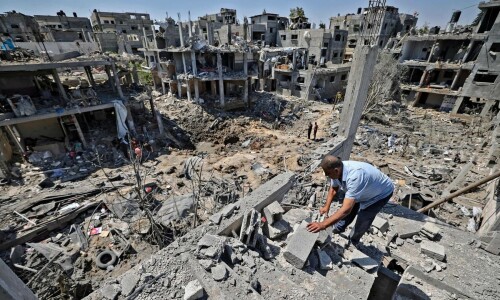KADAMRASUL (Bangladesh): Bangladeshi workers dismantling ships and recycling the vessels’ parts say they know their jobs are dangerous, but they have no better options to feed their families.
At least 10 workers were killed in mishaps and explosions on board ships while they were being dismantled over the past year, to raise the toll to over 1,000 since 1996, police say.
About 30,000 workers, only a few wearing boots and almost none with helmets, work in some 22 shipbreaking yards in Bangladesh to dismantle around 80 giant, out-of-service ocean-going vessels and oil-tankers on average every year.
Over the decades many other workers have been maimed, and some have become ill due to the effects of carcinogenic chemicals.
However, shipbreaking officials say the death rate was much higher during the initial stage of the Bangladesh shipbreaking industry in the early 1980s, and awareness, precautions and training have subsequently reduced casualties.
As a precaution every scrapped oil-tanker must sail to the yard from the port of origin with empty and open reservoirs, so lingering chemicals and residues get neutralised naturally through ventilation before docking, said a shipbreaker who declined to be named.
Explosions on scrapped oil-tankers were responsible for many of the fatalities in the business’s early days. More common recently are deaths from accidental falls or blows from metal pieces as ships are torn apart.
The heat of cutter flames and constant banging as hammers strike steel can also cause physical and mental problems.
“Besides accidents, shipbreaking workers are prone to many diseases including cancer, ulceration, sterility and deafness,” Akhtar Hossain Chowdhury, a teacher of dermatology in the Chittagong Medical College Hospital, said.
“We risk our lives here only to support our families, because hazard-free regular employment is not easily available,” said Mohammad Malek, a shipbreaking worker at a yard at Kadamrasul, near the country’s main Chittagong port some 270km southeast of the capital Dhaka.
“For every 12 hours of work contractors pay each of us $4.38,” barely sufficient to meet daily needs, said Malek.
The workers use primitive hammers, axes and acetylene flames to extract some 1.8 million tonnes of steel per annum, against Bangladesh’s needs of 3 million tonnes. The rest of its demand is met by steel imports.
“As the industry is vital for us we have taken steps to reduce mishaps, by imparting training and creating awareness among employers and workers,” said Capt. A.K.M. Shafiqullah, director-general of Bangladesh’s Department of Shipping.
The department is the leading authority issuing permission for importing, beaching and dismantling scrapped ships.
SHIP METAL PREFERRED: Bangladesh, which has no iron ore, prefers the metal from the ships as prices of steel billets rose to $1,000 a tonne recently in the world market, up 40 per cent over the last one year.
Though shipbreaking and other similarly hazardous work is banned in the West, companies based there still send disabled ships to poor countries like Bangladesh for scrapping and for recycling of parts.
“For example, engines of scrapped ships are re-imported by some western countries for re-use,” Kamaluddin Ahmed, owner of shipbreakers Arefin Enterprise, said.
Bangladesh’s 800 steel re-rolling mills consume all the metal retrieved from scrapped ship to produce construction rods and roofing sheets, said Ahmed, also a vice-president of the Bangladesh Shipbreakers Association.
Shipbreaking is the most dangerous among all recycling jobs in Bangladesh, including of batteries in which workers, some of them women and children, can receive serious acid burns, says Quamrul Islam Chowdhury, a noted environmentalist in Bangladesh.No women are employed in shipbreaking, but a few teenagers are seen helping their elders at the yards in the name of learning the work.
“They (Bangladeshis) take up the risky job, often knowing the deadly consequences, because they have no other way to beat abject poverty,” said Abul Momen, a columnist as well as a political and social analyst.
While critical of western countries for effectively shipping a dangerous activity elsewhere, Momen recognised the business as important for impoverished Bangladesh.
He said the government should adopt a national policy to protect and develop the $146 million a year industry as soon as possible.
Similar sentiments came from Larry Maramis, United Nations Development Programme country director for Bangladesh, a nation of 150 million people, most of whom work in subsistence agriculture.
“For ensuring sustainability of this vital industry, the government, employers and workers need to work together toward a decent work environment around human rights principles,” he said.
In a report following a study on shipbreaking conducted in 2004, the UNDP said: “The huge task of dismantling ships is done manually in Bangladesh, with basic protection like helmets, gloves or goggles not provided to the workers.
“However, it is an industry that Bangladesh can ill afford to lose. The nation has no domestic sources of iron ore and is faced with high prices for new steel in the international markets.”
A senior official of the shipping ministry, who declined to be named, said the government soon would announce a policy to safeguard workers’ interests while boosting the industry.—Reuters














































Dear visitor, the comments section is undergoing an overhaul and will return soon.